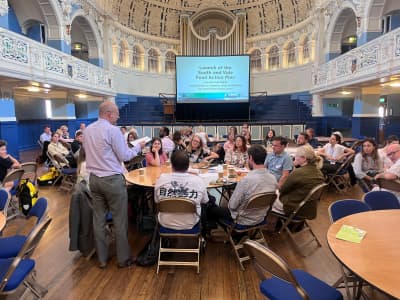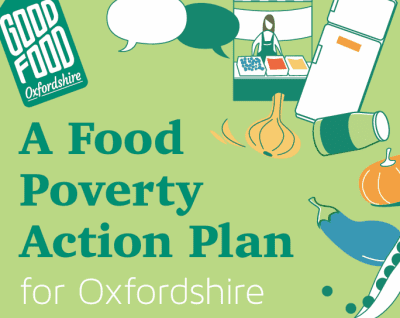As we celebrate another great Fairtrade Fortnight, here's a special blog from GFO member SESI Refills.
 FAIRTRADE FORTNIGHT
FAIRTRADE FORTNIGHT
For the next couple of weeks we celebrate Fairtrade Fortnight, we remind ourselves that it is important to surpass existing goals in pursuit of Trade Justice.
At SESI Food and Household Refills we have been supplying Fairtrade food in bulk since 2006. I grew up by a coffee forest in El Salvador during the civil war in the 80’s, having witnessed first hand the wrecking effects of labour exploitation. This is one of the reasons I will not stop supporting Fairtrade. SESI refills people’s containers from fairtrade bulk supply of some types of sugar, tea, cocoa powder, hot chocolate, olive oil, dried mango, dates, brazil nuts, cashews, sesame seeds, quinoa, Basmati rices and Jasmine rices.
Our core team visited the Salvadoran Apranoires, an amazing cooperative that produces organic cashew nuts used by Equal Exchange for cashew butter. My partner and I worked in this area with agricultural cooperatives in the early 1990s. We have also witnessed first hand the brilliant work of FLOCERT in Del Campo Coop in Leon, Nicaragua, growing sesame seeds and other organic crops.
Oh Sugar!
For nearly two years I’ve been following closely the plight of the sugar trade. We are unable to obtain fairtrade raw cane (or granulated) sugar in 25kg sacks because none of the wholesalers - ethical or otherwise – supply it. You can find pre-packed sugar (in plastic bags) in silly small amounts. Supermarkets like The Coop or Sainsbury pride themselves for supplying fairtrade goods but have a very small supply and selection of fairtrade sugars. If you wish to buy fairtrade Tate & Lyle raw cane sugar in sacks, you’d be stuck having to order it from big monopoly ASR (American Sugar Refining, Inc) who now owns Tate & Lyle, and the minimum order is 40x25kg sacks - of only one type of sugar. Doesn’t that beat the purpose of “fairtrade”? Most fairtrade sugar is destined to decorate the labels of highly commercial brands and some chain cafés. And that is just Fairtrade Sugar!
Digging deeper into the sugar trade we are reminded that this crop is heavily dependant on human slavery. Sugar is in everything, and if we wished to really make a wide impact towards just trade, we’d need to start taking care of
sugar. We have started with cocoa, bananas, tea and coffee, but isn’t it time to pay attention to the big elephant in the room? How can this OMNIPRESENT monocrop, filling the shelves of supermarkets and the food industry not be the next fairtrade main campaign? Maybe now that we are talking about sugar as an over consumed product in our diets and an ingredient present in most food going to waste, we might be able to transform the way with trade it, not just for concerns of our own but indeed to help abolish the human slavery still dragging in the sugar production.
Mango Mama
When your wholesaler’s commodity buyers don’t know all the answers about a product, it’s worth grabbing the phone and chasing along the food chain hierarchy until you get to the producer – or at least the chief director of imports in Holland (Gaston Smith) as I did to find out more about Mango Mamas. This brand of dried mango is produced in West African Burkina Faso.
Facts about Mango Mamas
- Most mango growers are male farmers
- Most people working in drying cooperatives and individual drying units are women
- Many of the drying units are owned by businesswomen
- The growers and driers can establish their own premium price for their goods, not the buyer
- All value added stays in Burkina Faso, because even the wooden ovens are made in the country and this promotes other local manufacturing and employment
- These solar powered ovens have a circular life as they can be repaired again and again, and eventually their parts are recycled.
Big buyers, the increasing demand on mango and changes in the climate are making it increasingly difficult for Mango Mamas to satisfy the market
Mango Mamas is a fine story, which tells us that when fairtrade works, it does it well.
Fairtrade Sugar? Over to you
So, unlike sugar, the expanding international trade of mango is not burdened by a slave heritage and an entrenched commodity industry. Fairtrade mango is a small player in the market, which is transforming the lives of the producers. Sugar needs combined forces in the fairtrade sector to create more opportunities for producers and cooperatives, and to wrest it out of the grip of speculators and monopolies. In this regard, we the consumers have the power to demand slavery free sugar, and once the market sees that we mean business, they will catch up with us.
 FAIRTRADE FORTNIGHT
For the next couple of weeks we celebrate Fairtrade Fortnight, we remind ourselves that it is important to surpass existing goals in pursuit of Trade Justice.
At SESI Food and Household Refills we have been supplying Fairtrade food in bulk since 2006. I grew up by a coffee forest in El Salvador during the civil war in the 80’s, having witnessed first hand the wrecking effects of labour exploitation. This is one of the reasons I will not stop supporting Fairtrade. SESI refills people’s containers from fairtrade bulk supply of some types of sugar, tea, cocoa powder, hot chocolate, olive oil, dried mango, dates, brazil nuts, cashews, sesame seeds, quinoa, Basmati rices and Jasmine rices.
Our core team visited the Salvadoran Apranoires, an amazing cooperative that produces organic cashew nuts used by Equal Exchange for cashew butter. My partner and I worked in this area with agricultural cooperatives in the early 1990s. We have also witnessed first hand the brilliant work of FLOCERT in Del Campo Coop in Leon, Nicaragua, growing sesame seeds and other organic crops.
Oh Sugar!
For nearly two years I’ve been following closely the plight of the sugar trade. We are unable to obtain fairtrade raw cane (or granulated) sugar in 25kg sacks because none of the wholesalers - ethical or otherwise – supply it. You can find pre-packed sugar (in plastic bags) in silly small amounts. Supermarkets like The Coop or Sainsbury pride themselves for supplying fairtrade goods but have a very small supply and selection of fairtrade sugars. If you wish to buy fairtrade Tate & Lyle raw cane sugar in sacks, you’d be stuck having to order it from big monopoly ASR (American Sugar Refining, Inc) who now owns Tate & Lyle, and the minimum order is 40x25kg sacks - of only one type of sugar. Doesn’t that beat the purpose of “fairtrade”? Most fairtrade sugar is destined to decorate the labels of highly commercial brands and some chain cafés. And that is just Fairtrade Sugar!
Digging deeper into the sugar trade we are reminded that this crop is heavily dependant on human slavery. Sugar is in everything, and if we wished to really make a wide impact towards just trade, we’d need to start taking care of sugar. We have started with cocoa, bananas, tea and coffee, but isn’t it time to pay attention to the big elephant in the room? How can this OMNIPRESENT monocrop, filling the shelves of supermarkets and the food industry not be the next fairtrade main campaign? Maybe now that we are talking about sugar as an over consumed product in our diets and an ingredient present in most food going to waste, we might be able to transform the way with trade it, not just for concerns of our own but indeed to help abolish the human slavery still dragging in the sugar production.
Mango Mama
FAIRTRADE FORTNIGHT
For the next couple of weeks we celebrate Fairtrade Fortnight, we remind ourselves that it is important to surpass existing goals in pursuit of Trade Justice.
At SESI Food and Household Refills we have been supplying Fairtrade food in bulk since 2006. I grew up by a coffee forest in El Salvador during the civil war in the 80’s, having witnessed first hand the wrecking effects of labour exploitation. This is one of the reasons I will not stop supporting Fairtrade. SESI refills people’s containers from fairtrade bulk supply of some types of sugar, tea, cocoa powder, hot chocolate, olive oil, dried mango, dates, brazil nuts, cashews, sesame seeds, quinoa, Basmati rices and Jasmine rices.
Our core team visited the Salvadoran Apranoires, an amazing cooperative that produces organic cashew nuts used by Equal Exchange for cashew butter. My partner and I worked in this area with agricultural cooperatives in the early 1990s. We have also witnessed first hand the brilliant work of FLOCERT in Del Campo Coop in Leon, Nicaragua, growing sesame seeds and other organic crops.
Oh Sugar!
For nearly two years I’ve been following closely the plight of the sugar trade. We are unable to obtain fairtrade raw cane (or granulated) sugar in 25kg sacks because none of the wholesalers - ethical or otherwise – supply it. You can find pre-packed sugar (in plastic bags) in silly small amounts. Supermarkets like The Coop or Sainsbury pride themselves for supplying fairtrade goods but have a very small supply and selection of fairtrade sugars. If you wish to buy fairtrade Tate & Lyle raw cane sugar in sacks, you’d be stuck having to order it from big monopoly ASR (American Sugar Refining, Inc) who now owns Tate & Lyle, and the minimum order is 40x25kg sacks - of only one type of sugar. Doesn’t that beat the purpose of “fairtrade”? Most fairtrade sugar is destined to decorate the labels of highly commercial brands and some chain cafés. And that is just Fairtrade Sugar!
Digging deeper into the sugar trade we are reminded that this crop is heavily dependant on human slavery. Sugar is in everything, and if we wished to really make a wide impact towards just trade, we’d need to start taking care of sugar. We have started with cocoa, bananas, tea and coffee, but isn’t it time to pay attention to the big elephant in the room? How can this OMNIPRESENT monocrop, filling the shelves of supermarkets and the food industry not be the next fairtrade main campaign? Maybe now that we are talking about sugar as an over consumed product in our diets and an ingredient present in most food going to waste, we might be able to transform the way with trade it, not just for concerns of our own but indeed to help abolish the human slavery still dragging in the sugar production.
Mango Mama When your wholesaler’s commodity buyers don’t know all the answers about a product, it’s worth grabbing the phone and chasing along the food chain hierarchy until you get to the producer – or at least the chief director of imports in Holland (Gaston Smith) as I did to find out more about Mango Mamas. This brand of dried mango is produced in West African Burkina Faso.
Facts about Mango Mamas
When your wholesaler’s commodity buyers don’t know all the answers about a product, it’s worth grabbing the phone and chasing along the food chain hierarchy until you get to the producer – or at least the chief director of imports in Holland (Gaston Smith) as I did to find out more about Mango Mamas. This brand of dried mango is produced in West African Burkina Faso.
Facts about Mango Mamas



